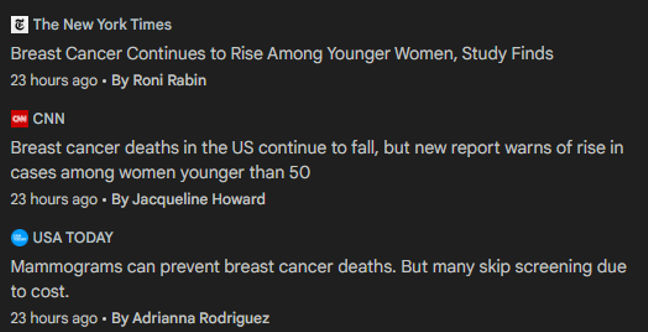According to the “The New York Times” & CNN news
Breast Cancer is continues to rise among younger women’s
Health News cover all details about the Breast Cancer.

Breast Cancer: Overview Health news
- Breast cancer is one of the most common types of cancer affecting women worldwide.
- It occurs when cells in the breast tissue grow uncontrollably, leading to the formation of tumors.
- While breast cancer primarily affects women, it can also occur in men.
- Risk factors include age, genetic predisposition, family history, hormonal factors, and lifestyle choices.
Symptoms of Breast Cancer-Health News
- A lump or mass in the breast or underarm area
- Changes in the size or shape of the breast
- Skin changes on the breast (dimpling, redness, or flakiness)
- Unexplained swelling or pain
- Nipple discharge or changes in the nipple
Recovery Strategies– Health News
Recovery from breast cancer involves a multifaceted approach, including medical treatment, lifestyle modifications, and emotional support. Here are some key strategies:
- Medical Treatment:
- Surgery: Removal of the tumor or the entire breast (mastectomy).
- Radiation Therapy: Targeted radiation to destroy cancer cells.
- Chemotherapy: Use of drugs to kill cancer cells, often used before or after surgery.
- Hormone Therapy: Medications that block hormones that fuel some types of breast cancer.
- Emotional Support:
- Counseling: Professional counseling or support groups can provide emotional support.
- Mindfulness and Meditation: Practices that promote relaxation and mental well-being.
Yoga Practices for Breast Cancer Recovery
Yoga can be beneficial for those recovering from breast cancer. It helps improve flexibility, strength, and mental clarity, and can alleviate stress. Here are some recommended yoga poses:
- Cat-Cow Stretch (Marjaryasana-Bitilasana)
- Benefits: Increases spine flexibility, alleviates back pain.
- Instructions: Begin on all fours, alternate arching and rounding your back.
- Child’s Pose (Balasana)
- Benefits: Provides relaxation, stretches the back and hips.
- Instructions: Kneel and sit back on your heels, extending your arms forward.
- Gentle Twists (Seated or Standing)
- Benefits: Improves digestion and detoxification.
- Instructions: While seated or standing, gently twist your torso to each side.
- Bridge Pose (Setu Bandhasana)
- Benefits: Strengthens the back, opens the chest.
- Instructions: Lie on your back, knees bent, lift your hips while pressing your arms into the mat.
- Savasana (Corpse Pose)
- Benefits: Promotes relaxation and stress relief.
- Instructions: Lie flat on your back, arms at your sides, and focus on your breath.
Dietary Recommendations for Breast Cancer Recovery
A well-balanced diet can support recovery and overall health. Here are some dietary recommendations:
- Fruits and Vegetables:
- Aim for a variety of colorful fruits and vegetables rich in antioxidants, vitamins, and minerals. Examples include berries, leafy greens, and cruciferous vegetables (broccoli, kale).
- Whole Grains:
- Choose whole grains like brown rice, quinoa, and whole-wheat bread over refined grains. They provide fiber and essential nutrients.
- Lean Proteins:
- Incorporate sources of lean protein such as fish, poultry, legumes, and nuts. Omega-3 fatty acids found in fatty fish (like salmon) may have anti-inflammatory effects.
- Healthy Fats:
- Include sources of healthy fats like avocados, olive oil, and nuts. These can support heart health.
- Limit Processed Foods:
- Avoid highly processed foods, sugary snacks, and excessive alcohol, as these can negatively impact health.
Lifestyle Changes to Consider
- Regular Exercise:
- Engage in regular physical activity to maintain a healthy weight, reduce stress, and improve overall health.
- Maintain a Healthy Weight:
- Obesity is a risk factor for breast cancer, so maintaining a healthy weight through diet and exercise is crucial.
- Avoid Tobacco:
- Smoking is linked to many types of cancer, including breast cancer. Seek support to quit if needed.
- Limit Alcohol Consumption:
- Alcohol can increase the risk of breast cancer; limit intake to moderate levels or avoid altogether.
- Stay Informed:
- Regular check-ups and screenings (like mammograms) are essential for early detection and monitoring.
Conclusion
- While a breast cancer diagnosis can be daunting, staying informed through reliable health news and taking proactive steps towards recovery can significantly improve outcomes and quality of life.
- With regular access to trusted health news, patients and their families can stay updated on the latest medical breakthroughs, treatment options, and lifestyle recommendations.
- Combining medical treatment with practices like yoga, a well-balanced diet, and essential lifestyle changes backed by current health news can empower individuals to make informed decisions.
- It’s important to remember that health news sources, such as medical journals and health organizations, play a crucial role in providing the latest insights into cancer care and recovery.
- As new studies and treatments are developed, staying up-to-date on health news allows patients to explore the most current information available for managing their condition.
- Always consult your healthcare providers for personalized advice, and use reputable health news platforms to remain well-informed about emerging trends in cancer research and wellness.
- By combining expert medical advice with the latest in health news, patients can approach their recovery with confidence, ensuring the best possible outcomes.
